
Resources
Browse our full library of in-depth resources and publications
The PacWastePlus programme team is committed to producing meaningful and valuable publications and resources that provides guidance for improving waste management in the Pacific
Search
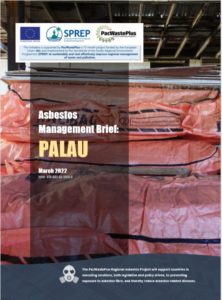
Factsheet
Asbestos Management Brief: PALAU
The PacWastePlus Regional Asbestos Project will support countries in executing solutions, both legislative and policy-driven, to prevent exposure to asbestos fibre, and thereby reduce asbestos-related diseases. This document provides guidance for Palau to progress work on the development and implementation of a National ACM ban with this resource providing background information, identifying policy and legislative options available.
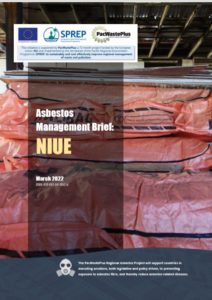
Factsheet
Asbestos Management Brief: NIUE
The PacWastePlus Regional Asbestos Project will support countries in executing solutions, both legislative and policy-driven, to prevent exposure to asbestos fibre, and thereby reduce asbestos-related diseases. This document provides guidance for Niue to progress work on the development and implementation of a National ACM ban with this resource providing background information, identifying policy and legislative options available.
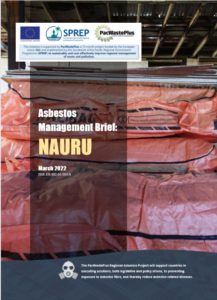
Factsheet
Asbestos Management Brief: NAURU
The PacWastePlus Regional Asbestos Project will support countries in executing solutions, both legislative and policy-driven, to prevent exposure to asbestos fibre, and thereby reduce asbestos-related diseases. This document provides guidance for Nauru to progress work on the development and implementation of a National ACM ban with this resource providing background information, identifying policy and legislative options available.
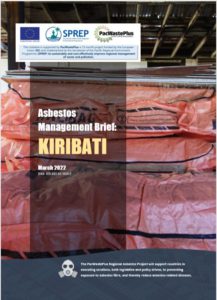
Factsheet
Asbestos Management Brief: KIRIBATI
The PacWastePlus Regional Asbestos Project will support countries in executing solutions, both legislative and policy-driven, to prevent exposure to asbestos fibre, and thereby reduce asbestos-related diseases. This document provides guidance for Kiribati to progress work on the development and implementation of a National ACM ban with this resource providing background information, identifying policy and legislative options available.
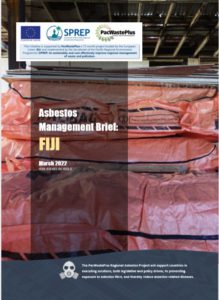
Factsheet
Asbestos Management Brief: FIJI
The PacWastePlus Regional Asbestos Project will support countries in executing solutions, both legislative and policy-driven, to prevent exposure to asbestos fibre, and thereby reduce asbestos-related diseases. This document provides guidance for Fiji to progress work on the development and implementation of a National ACM ban with this resource providing background information, identifying policy and legislative options available.
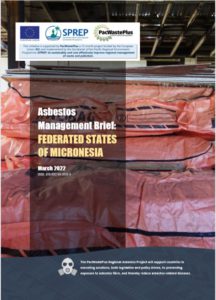
Factsheet
Asbestos Management Brief: FSM
The PacWastePlus Regional Asbestos Project will support countries in executing solutions, both legislative and policy-driven, to prevent exposure to asbestos fibre, and thereby reduce asbestos-related diseases. This document provides guidance for FSM to progress work on the development and implementation of a National ACM ban with this resource providing background information, identifying policy and legislative options available.
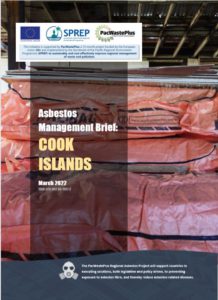
Factsheet
Asbestos Management Brief: COOK ISLANDS
The PacWastePlus Regional Asbestos Project will support countries in executing solutions, both legislative and policy-driven, to prevent exposure to asbestos fibre, and thereby reduce asbestos-related diseases. This document provides guidance for Cook Islands to progress work on the development and implementation of a National ACM ban with this resource providing background information, identifying policy and legislative options available.
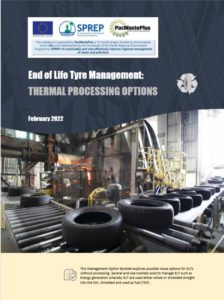
Booklet
End of Life Tyre Management: Thermal Processing Options
This Management Option Booklet explores possible reuse options for ELTs without processing. Several end-use markets exist to manage ELT such as Energy generation whereby ELT is used either whole or shredded straight into the kiln. shredded and used as fuel (TDF)
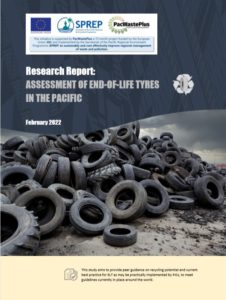
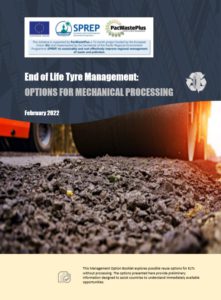
Booklet
End of Life Tyre Management: Options for Mechanical Processing
This Management Option Booklet explores possible reuse options for ELTs without processing. The options presented here provide preliminary information designed to assist countries to understand immediately available opportunities.
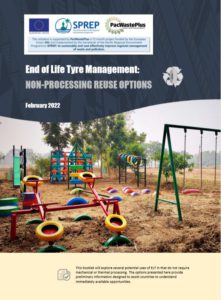
Booklet
End of Life Tyre Management: Non-Processing Reuse Options
This booklet explores several potential uses of ELT that do not require mechanical or thermal processing. The options presented here provide preliminary information designed to assist countries to understand immediately available opportunities.
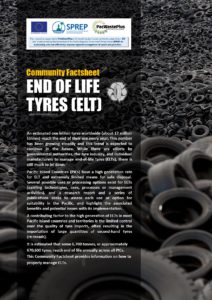
Factsheet
End of Life Tyres (ELT)-Community Factsheet
Pacific Island Countries (PICs) have a high generation rate for ELT and extremely limited means for safe disposal. Several possible uses or processing options exist for ELTs (existing technologies, uses, processes, or management activities), and a research report and a series of publications seek to assess each use or option for suitability in the Pacific and highlight the associated benefits and potential issues with its implementation.
Newsletter Subscription
Would you like to subscribe to our quarterly programme newsletter-The Connection?
We care about the protection of your data. Read our Privacy Policy.
Newsletter Signup
To sign up to our newsletter, enter the information below and we will add you to our mailing list for all future regional and project updates.
